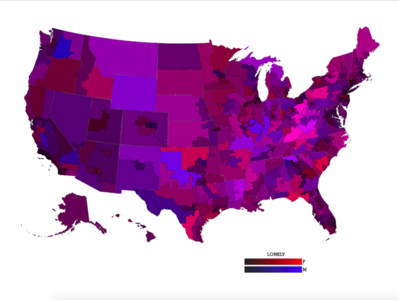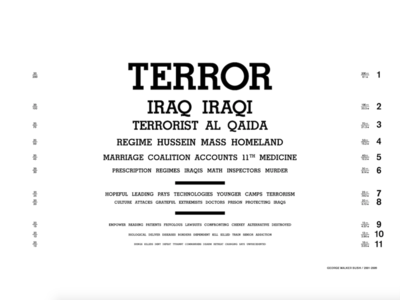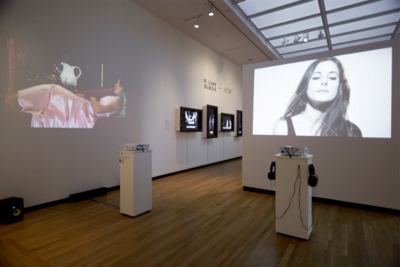Examining the Data: R. Luke DuBois at Bowdoin College Museum of Art

R. Luke DuBois, A More Perfect Union: Lonely, 2011, pigment-ink on photo rag, 18” x 24”. All images courtesy Bowdoin College Museum of Art.
By Olivia J. Kiers
In an age of dizzying social and political upheaval paired with information overload, R. Luke DuBois’ data-driven artworks feel right at home, pulling the viewer into an examination of complex (and often sprawling) issues with the ease of a quick Google search. A captivating mix of identity crisis and identity exposure, DuBois’ solo show at Bowdoin College Museum of Art (R. Luke DuBois—Now, through September 4) allows us to reconsider modern America through algorithms that paint portraits and musical compositions that warp time.

R. Luke DuBois, Sergey Brin and Larry Page, 2013, two-channel generative HD video, commissioned by the National Portrait Gallery, Washington D.C.
Born in the United States and raised in the United Kingdom, DuBois is a composer, artist and software author who examines American culture by subjecting it to the empirical eye of his software programs. He takes nothing for granted. Yet, while the act of examination is critical to DuBois’ approach, his work is often imbued with wry humor, bringing subjective philosophizing into the mix. For Sergey Brin and Larry Page (2013), an unconventional portrait of the two founders of Google commissioned by the National Portrait Gallery in Washington, D.C., DuBois created software that inputs words from video footage of the co-founders’ public appearances into Google’s search engine, which then populates a second screen with a real-time visualization of search results. Subjecting the creators to their own creation reveals a kind of “Frankenstein’s monster” anxiety that many feel about today’s rapidly morphing technology and artificial intelligence fields. In Sergey Brin and Larry Page, the conventional footage of Google’s co-founders is lifeless in comparison with the dynamic cloud of their “portrait in data,” as DuBois calls it.

R. Luke DuBois, Hindsight is Always 20/20, George W. Bush, 2008, set of 43 letterpress prints, 21.25” x 28.25”.
The internet and our use of it sets a tone for the entire show, from DuBois’s email- and Facebook-based self-portraits, to A More Perfect Union (2010-11), the wall-sized map of words mined from 19 million online dating profiles, in which city names are replaced with regional themes—binoculars are included on a nearby gallery bench for the curious. Yet, the digital realm is hardly the only source for DuBois’ endless search for identity via data. Hindsight is Always 20/20, a series of 43 letterpress prints resembling eye charts, places U.S. history under the lens of presidential State of the Union addresses. Originally created for the 2008 Democratic National Convention, each print organizes the words utilized by an American president according to frequency. The most highly used word is placed at the top of the chart, with words of lesser frequency falling below in shrinking fonts. Word choice is revealing, and political history leaps from the wall in bold font, from George Washington’s “GENTLEMEN” to Abraham Lincoln’s “EMANCIPATION” and George W. Bush’s “TERROR.”

Installation view, Bowdoin College Museum of Art.
To focus on only a few works is, unfortunately, to do the exhibition a disservice, as the full experience is one of endless variety, a surround-sound of circus performers, Academy Award-winners, activists on Twitter, Billboard hits, Playboy gazes, slow-motion musicians and Craigslist “missed connections.” This is a show that, taken all together, asks profound questions of identity and purpose, questions that cannot be answered by any one artwork, though the data always offers compelling clues. Exploring R. Luke DuBois—Now is to explore a world both alien and unnervingly familiar.
